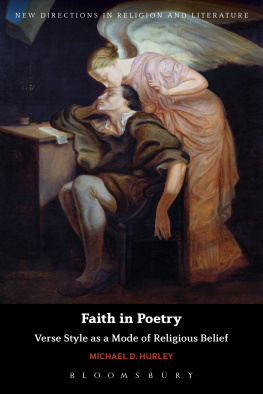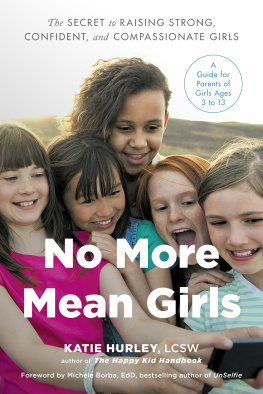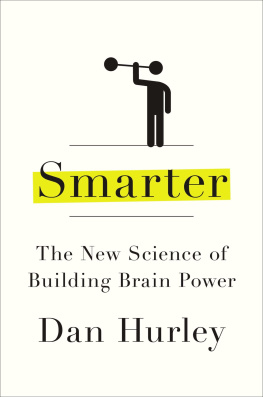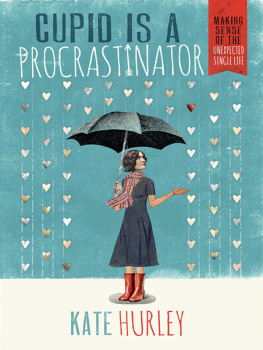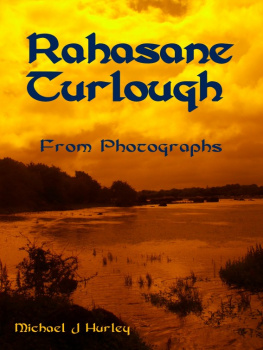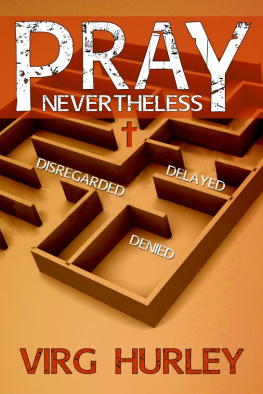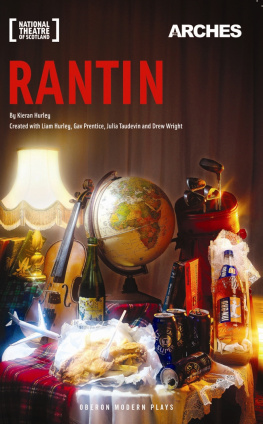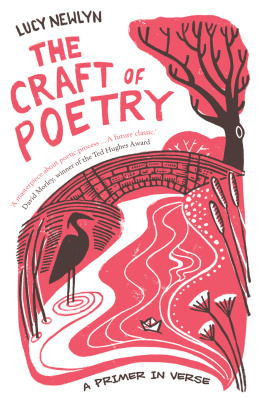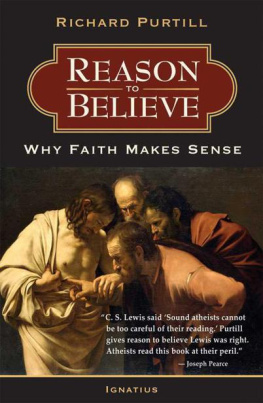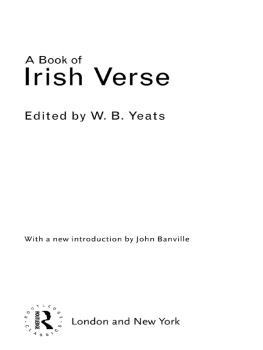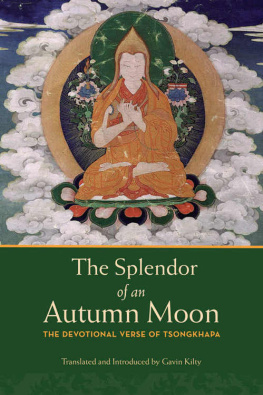Hurley - Faith in poetry: verse style as a mode of religious belief
Here you can read online Hurley - Faith in poetry: verse style as a mode of religious belief full text of the book (entire story) in english for free. Download pdf and epub, get meaning, cover and reviews about this ebook. publisher: Bloomsbury UK, genre: Detective and thriller. Description of the work, (preface) as well as reviews are available. Best literature library LitArk.com created for fans of good reading and offers a wide selection of genres:
Romance novel
Science fiction
Adventure
Detective
Science
History
Home and family
Prose
Art
Politics
Computer
Non-fiction
Religion
Business
Children
Humor
Choose a favorite category and find really read worthwhile books. Enjoy immersion in the world of imagination, feel the emotions of the characters or learn something new for yourself, make an fascinating discovery.
- Book:Faith in poetry: verse style as a mode of religious belief
- Author:
- Publisher:Bloomsbury UK
- Genre:
- Rating:5 / 5
- Favourites:Add to favourites
- Your mark:
- 100
- 1
- 2
- 3
- 4
- 5
Faith in poetry: verse style as a mode of religious belief: summary, description and annotation
We offer to read an annotation, description, summary or preface (depends on what the author of the book "Faith in poetry: verse style as a mode of religious belief" wrote himself). If you haven't found the necessary information about the book — write in the comments, we will try to find it.
Faith in poetry: verse style as a mode of religious belief — read online for free the complete book (whole text) full work
Below is the text of the book, divided by pages. System saving the place of the last page read, allows you to conveniently read the book "Faith in poetry: verse style as a mode of religious belief" online for free, without having to search again every time where you left off. Put a bookmark, and you can go to the page where you finished reading at any time.
Font size:
Interval:
Bookmark:

Faith in Poetry
NEW DIRECTIONS IN RELIGION AND LITERATURE
This series aims to showcase new work at the forefront of religion and literature through short studies written by leading and rising scholars in the field. Books will pursue a variety of theoretical approaches as they engage with writing from different religious and literary traditions. Collectively, the series will offer a timely critical intervention to the interdisciplinary crossover between religion and literature, speaking to wider contemporary interests and mapping out new directions for the field in the early twenty-first century.
Also available from Bloomsbury
Beyond the Willing Suspension of Disbelief , Michael Tomko
The Bible in the American Short Story , Lesleigh Cushing Stahlberg and Peter S. Hawkins
Blake. Wordsworth. Religion , Jonathan Roberts
Dante and the Sense of Transgression , William Franke
Do the Gods Wear Capes? , Ben Saunders
Englands Secular Scripture , Jo Carruthers
Faith in Poetry , Michael D. Hurley
Forgiveness in Victorian Literature , Richard Hughes Gibson
The Glyph and the Gramophone , Luke Ferretter
The Gospel According to David Foster Wallace, Adam S. Miller
The Gospel According to the Novelist , Magdalena Maczynska
Jewish Feeling , Richa Dwor
John Cage and Buddhist Ecopoetics , Peter Jaeger
Late Walter Benjamin , John Schad
The New Atheist Novel , Arthur Bradley and Andrew Tate
Pentecostal Modernism , Stephen Shapiro and Philip Barnard
Rewriting the Old Testament in Anglo-Saxon Verse , Samantha Zacher
Victorian Parables , Susan E. Coln
Forthcoming
Romantic Enchantment , Gavin Hopps
Sufism in Western Literature , Art and Thought, Ziad Elmarsafy
Weird Faith in 19th Century Literature , Mark Knight and Emma Mason
For Jilly
Faith in Poetry
Verse Style as a Mode of Religious Belief
MICHAEL D. HURLEY
Bloomsbury Academic
An imprint of Bloomsbury Publishing Plc

Contents
This book was written in a concentrated burst but after a long period of gestation. The debts I owe are therefore pressingly current but also go rather far back, and I cannot register them all here. I should, however, like to pay special thanks to the late Peter Hardwick, formerly of Stonyhurst College, who was the greatest of teachers, and who first inspired my own faith in poetry; he remains the reader over my shoulder. I am immensely grateful to the people who generously (in every sense) read draft chapters, or who took the time to discuss my inchoate ideas: Stephen Blackwood, Thomas Docherty, Martin Dubois, Sarah Haggarty, Jason Harding, Ewan Jones, Robin Kirkpatrick, Raphael Lyne, Anna Nickerson, Marcus Waithe, Phyllis Weliver and Ross Wilson. Mark Knight and Emma Mason, the series editors for Bloomsbury, were good enough to encourage me to write something for them in the first place, and their feedback on my ensuing manuscript was brilliantly insightful, and much appreciated. Over the years, my students have helped me refine my appreciation of the poets covered in this study, and I value especially the MPhil class of 2017 who took my course on Faith in Poetry: their lively and incisive contributions were wonderful stimulation in the final stages of writing up. Finally, I must thank the Master and Fellows of St Catharines College, Cambridge, for supporting my research. This book is dedicated to my fiercely loving and loyal wife, sine qua non .
University of Cambridge
Lent 2017
You can refute Hegel but not the Saint or the Song of Sixpence.
Poets profess their faith in poetry by trusting it to say and do things that could not otherwise be said or done. To versify is to believe in verse. Composition is poetrys essential credo, as it is also its best proof, avowing while demonstrating its special status and facility. Why not turn instead to prose, or sculpture, or the medium of dance? If the same or better might be achieved in another way, poetry would have no exclusive value; whereas its presence at the heart of Western culture declares the opposite.
So much is clear, but little else. Poets bear witness to their faith in poetry through their poems, but quite what it is that poetry can achieve, or should do, has yielded diverse and sometimes incompatible verdicts. The Iliad and The Odyssey are equivocal in the claims they make for poetrys ability to afford, on the one hand, powerfully transporting experiences and, on the other hand, transformative philosophical or moral truths.the same might be said of poetics: Platos interventions set the terms and frame the debates that follow.
But Christian poets also change the poetic paradigm, by compounding the creative burden. They make their art accountable to the immanent stringencies of the artisan, but also to the transcendent truths of their God. Decanting visions, convictions or dogmas into inapt forms makes poor poetry, and by extension, the religious faith to which it speaks lacks vitality, and perhaps authenticity too. Metaphysics snatches at the spiritual in an idea, by the most abstract intellection; poetry reaches it in the flesh, by the very point of the sense sharpened through intelligence:
Putting faith in poetry in that double sense poetic and religious conjoins aesthetics with metaphysics; if either is forced or faulty, neither succeeds. Or to make the same point positively, exemplars from the Christian tradition evince a profound, creative continuity between their subjects and their styles. Boethiuss De consolatione philosophiae , for instance, has been described as having had the single most important influence on Christianity of the Middle Ages and early Renaissance,
Almost eight centuries later, when Dante came to write his own poema sacro , he was similarly preoccupied with how verse might enable his theological and religious vision, as well as his creedal understanding. I have elsewhere argued for the puissance of Dantes prosody in respect of his faith,vaunts the poet as craftsman ( fabbro ) as well as visionary, and that while his Commedia identifies Boethius as the first of the Scholastics among the doctors in his Paradise, he does not emulate Boethian style. He rejects the august epic of classical antiquity in favour of a self-consciously rough vernacular diction ( De vulgari eloquentia ), and his own metrical innovation of terza rima suggests at a macro-level what his micro-choices of individual word, image, rhythm and rhyme reveal throughout. Namely, that while the poems faith is framed by doctrine, and Dantes theological allegiances are implicated at the deepest level of his verse form (in the Trinitarian associations of terza rima , not to mention the wider structural occurrences of threes, nines and thirty-three in the poem), his faith is also experienced dynamically, as a perilously unfolding journey, spurred into life and purpose at the turn of each new rhyme and line.
To take one final example: when, in the turbulent wake of the Reformation, Milton took up his pen to justify the ways of God to man, he too was aware that he must first justify the ways of poetry. Paradise Lost is governed by a self-consciously re-formed poetics, by strategies that are prosodically as well as doctrinally at odds with Dantes example, seen most conspicuously in his rejection of end-rhyme, which he dismisses as bondage, and as part of a regrettable Catholic habit of distracted jingling.
What connects Boethius, Dante and Milton, what makes them exemplars here, is not the plain fact that they were all poets who wrote on religious themes. Collectively, whats instructive about De consolatione philosophiae , the Commedia , and Paradise Lost is the way these great poems among the greatest in the Christian tradition explore as well as express the religious truth that is their theme. They form part of an unbroken canon that, while wrangling over ecclesiastical and aesthetic details, invests in verse as a unique mode. Poetry within this tradition is religious not merely for what it illustrates, but for what it is. The pressing challenge for all poets is one of commensurability: to find or found a style adequate to their subjects. But at its height, religious poetry asks more of itself than that its form might find continuity with its content; it aims not simply to delineate theological niceties, but to become itself an efficacious mode of theology. The task is severe, but its importance and possibility are vigorously persistent.
Font size:
Interval:
Bookmark:
Similar books «Faith in poetry: verse style as a mode of religious belief»
Look at similar books to Faith in poetry: verse style as a mode of religious belief. We have selected literature similar in name and meaning in the hope of providing readers with more options to find new, interesting, not yet read works.
Discussion, reviews of the book Faith in poetry: verse style as a mode of religious belief and just readers' own opinions. Leave your comments, write what you think about the work, its meaning or the main characters. Specify what exactly you liked and what you didn't like, and why you think so.

